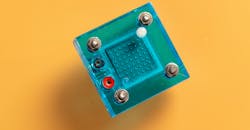Zero emission hydrogen fuel cell powered vehicle manufacturer Hyzon Motors Inc. recently announced its plans to build the largest fuel cell membrane electrode assembly (MEA) production line for commercial vehicles in the United States at its new Hyzon Innovation Center located in Bolingbrook, Illinois, just outside of Chicago.
The MEA is the critical component of a fuel cell and accounts for about 70% of the cost of a fuel cell stack. MEAs are currently produced in Canada, Europe, Japan, Korea and China at commercial scale. Smaller scale MEA production in the United States has so far been a supply and cost bottleneck for US fuel cell vehicle production.
George Gu, chairman, Hyzon Motors, tells IndustryWeek, “The facility is expected to commence production of MEAs in the fourth quarter of 2021, and is planned to open with 28,000 square feet of manufacturing space, before expanding in a second phase to 80,000 square feet,” he says. “At full capacity, the Hyzon Innovation Center is expected to produce enough MEAs to cover the production needs for up to 12,000 hydrogen fuel cell powered trucks every year.”
According to Gu, Hyzon chose the greater Chicago area due to its top-tier universities, national labs, equipment companies and manufacturers, and a large pool of talent for recruiting a highly-skilled workforce. “We are looking forward to empowering this unique ecosystem so that we can further accelerate the energy transition and decarbonize heavy road transport,” he says.
Hyzon CEO and Co-founder Craig Knight said in a statement, "We are excited about our plans to open the first high-volume MEA production line for hydrogen fuel cells in the US, which we anticipate will enable us to rapidly scale up the production of our fuel cells and deliver up to 12,000 Hyzon zero-emission heavy vehicles each year. We see a substantial uptake in Europe already, and anticipate North America will soon follow suit on this decarbonization journey for heavy transport."
Strategic move
The Innovation Center will be our base for core material production and for advanced research. At full capacity, it can produce enough MEAs for 12,000 commercial vehicles per year, sufficient to meet all Hyzon internal needs over the next several years and be scaled up with demand, explains Gu. “We intend to apply our technologies further to electrolyzers and solid state batteries. They are all electrochemical devices and need solid polymer electrolyte, which we have 17 years of experience.”
The Hyzon Innovation Center will also conduct research and development on materials for fuel cells, electrolyzers, solid-state batteries, advanced e-drive systems, autonomous driving technologies and green hydrogen production technologies.
In addition to the Hyzon Innovation Center outside Chicago, Hyzon has two facilities in Rochester, New York – one serving as a fuel cell testing facility and the other as its US headquarters, fuel cell engine production facility, and vehicle integration center. The Company currently produces commercial vehicles at its facility in Groningen, The Netherlands, through a joint venture with Holthausen Clean Technology B.V.
About the Author
Peter Fretty
Technology Editor
As a highly experienced journalist, Peter Fretty regularly covers advances in manufacturing, information technology, and software. He has written thousands of feature articles, cover stories, and white papers for an assortment of trade journals, business publications, and consumer magazines.
